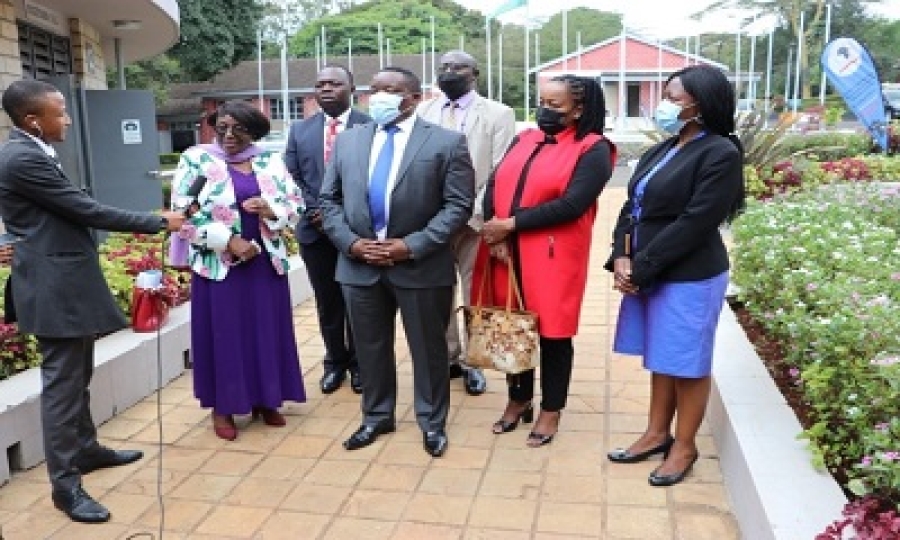Enhancing Graduate Employability: National Conference on Matching Curricula to Labour Market Demands
Written by Philip Rutto, MoE & Thuo Karanja, CEMASTEA
The Ministry of Education, State Department for Post Training and Skills Development (SD-PTSD) hosted a three-day national conference on matching curricula to labour market demands in tertiary education. The conference held from 7th to 9th December 2021 at the Centre for Mathematics, Science and Technology Education in Africa built on the momentum of two previous conferences that the Department organized in 2019 in collaboration with the Linking Industry with Academia Programme Trust. The conference under the theme: Enhancing Graduate Employability provided a platform for government, industry, development partners and the private sector to come together, reflect upon skills mismatch and commit to strengthening the school-to-work transition.
Left to Right, Prof Fatuma Chege, Principal Secretary State Dept. for Implementation of Curriculum Reforms, Mr. Alfred Cheruiyot, Principal Secretary State Department for Post Training and Skills Development, Dr Wanjiru Kariuki, Conference Chair and, Jacinta Akatsa, Director CEMASTEA giving a presser about the conference
During the conference's opening ceremony, Cabinet Secretary for Education Professor George Magoha, represented by Mr Alfred Cheruiyot, Principal Secretary (SD-PTSD), noted that the conference created a unique opportunity to demonstrate commitment to collaborate towards strengthening the school to work transition. The CS called for smooth routes upon which youth would exit from classrooms to places of work and stressed the elimination of barriers that impedes access to employment by graduates.
The conference attracted 150 face to face participants and more than 200 online participants. There were eight thematic areas with 29 presentations and a panel discussion. All presentations were very informative, linking with the theme of the conference. Keynote presenters at the conference included four Principal Secretaries; Mr Alfred Cheruiyot, PS State Department for Post Training and Skills Development; Amb. Simon Nabukwesi, PS, State Department of University Education and Research; Professor Prof. Fatuma Chege, PS State Dept. for Implementation of Curriculum Reforms and Mr Charles T. Sunkuli, PS State Dept. for Youth Affairs, Ministry of ICT Innovation and Youth Affairs. Each of the Principal Secretaries delivered a keynote speech. PS Alfred Cheruiyot noted that “data on unemployment rate stands at 10.4% while labour underutilization rate is at 17.2%, the labour market thus needs more skilled graduates”. He mentioned that the Ministry of Education is developing policies to streamline skills development in training institutions.
Professor Fatuma Chege, while acknowledging the existence of skills gaps, said the country is ripe for a shift in the education system. Her presentation detailed the government's efforts to transition to the Competency-Based Curriculum. In his presentation, Ambassador Nabukwesi noted that universities produce more graduates trained in arts subjects than Science, Engineering, Technology and Mathematics (STEM).
Chief Guest at the closing ceremony Principal Secretary Mr Alfred Cheruiyot noted that while progress had been made since the last conference, including policies and interventions, challenges towards matching curriculum to labour market demands still existed. These included limited resources, changing trends of skills and technology required by the industry that do not match the curricula, and industry reluctance in offering work-based learning opportunities. Director CEMASTEA presented a paper on the title “Developing employability through Science, Technology and Innovation”
Drivers of Change: Source; Alice Vozza, Skills and Lifelong Learning Specialist ILO DWT CO Pretoria
Some of the recommendations from the conference included; the development of a multi-sectoral framework to guide industry and tertiary institutions linkages and collaborative partnerships, the need to incentivize industry and encourage them to take in youth and graduates of tertiary institutions for work-based learning programmes; collaborative research with both industry and tertiary institutions; strengthening the office of career services in tertiary institutions and developing of a graduate tracking and labour management services. In collaboration with other stakeholders, the ministry of education will develop an action plan and a workshop to fast-track the recommendations from the conference.
Group photo of conference participants
Latest from Esther Nyambura
- CEMASTEA Hosts Successful INSET Centre Principals’ Workshop
- CEMASTEA Conducts Successful Holistic Learning Training for Rwandan Teachers
- Empowering Quality Standards and Assurance Officers (QASOs) for Enhanced STEM Education
- Science and Mathematics Teachers Pilot Symposium: Innovative Classroom Practices
- CEMASTEA Strategic Plan 2023 – 2027: Key Highlights

